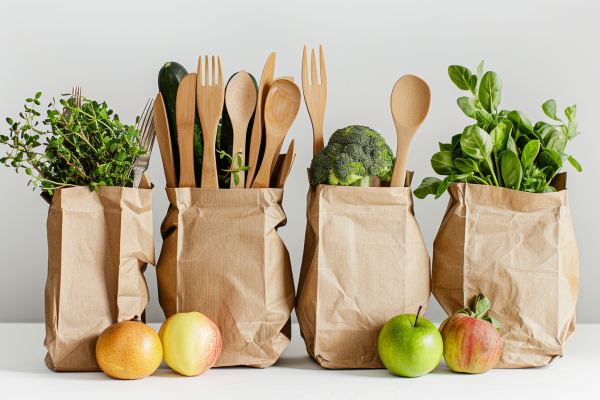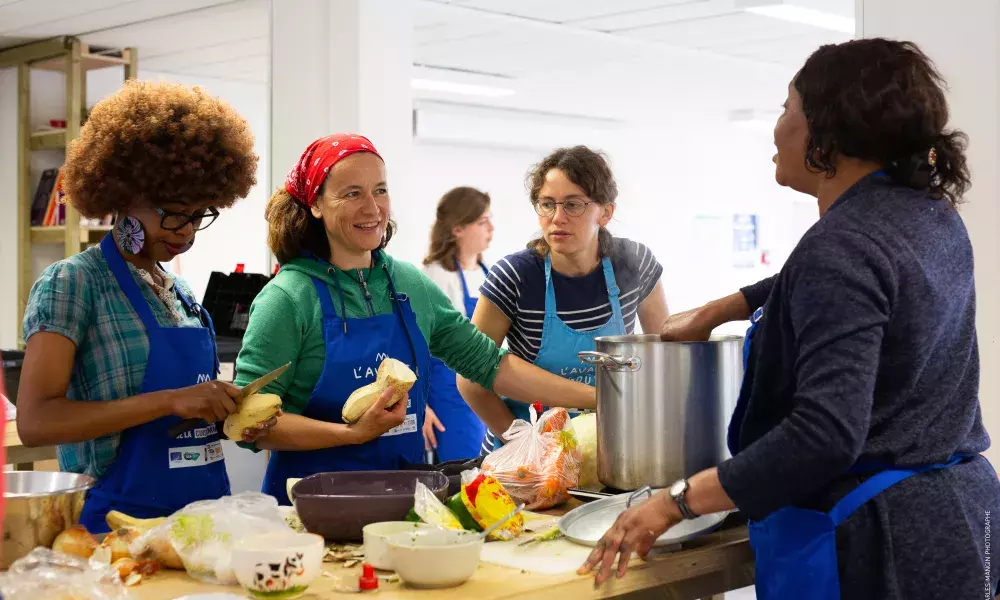
Four EU cities where food is an ingredient for change
1. Collective cooking feeds jobs and cohesion around a former industrial site – Lille, France
The topic of food is causing a buzz around a renovated warehouse on a 20-hectare former brownfield site in the post-industrial neighbourhood of Fives, Lille, France. A week of celebrations marked the Chaud Bouillon food court’s public opening in March 2024. This was the last step in a food-focused UIA project set up to fight poverty, unemployment and social exclusion in a neighbourhood where 50% of people live under the poverty line.
Partnering with public and private bodies, NGOs and researchers, Lille launched the TAST'inFIVES project as part of broader urban regeneration plans. The City of Lille wanted to involve residents in creating and running a communal kitchen using a collective governance model. Receiving a share of profits made onsite, it would be financially autonomous, providing:
- An inclusive place for socialising, with spaces and equipment for cooking, eating and meeting, an audio-visual studio, technology for vertical agriculture, etc.
- Workshops, for example against food waste and malnutrition.
- A virtuous ecosystem of training and job opportunities, restaurants and food processing activities.
A temporary prototype, launched in September 2017, involved residents, restaurants, caterers, charities, and social NGOs. They tested the project’s location, co-creation model, governance and activities. An integrated ecosystem started to form.
Today, the site hosts diverse activities in urban agriculture, culinary transformation, and catering – while fighting waste and facilitating access to healthy food for all. Crops, from mushrooms to edible flowers, are growing. So too are social and economic opportunities.

Copyright: Charles Mangin Photographe
2. A peri-urban agricultural innovation hub for new skills and social inclusion – Milan, Italy
Building on the 2015 Milan Urban Food Policy Pact, the OpenAgri project of UIA was set up to foster a diverse, multi-actor agri-food sector at the city’s edge, contributing to the area’s regeneration. It promoted innovative new urban food enterprises, green transport, and skills to lower farming’s environmental impacts.
To achieve this, OpenAgri founded an ‘Open Innovation Hub on Peri-Urban Agriculture’ on a 30-hectare plot on Milan’s urban-rural fringe. Run by a municipally-owned company to guarantee long-term financial sustainability, the living lab promotes entrepreneurial, social, sustainable and technological innovation. With a strong focus on inclusion, it supported the creation of 18 local projects, including a new beer, ‘from city farm to pint’.
OpenAgri’s innovative approach groups several food policy experiments within a single integrated strategy, including:
- Start-ups and training, including public-private collaboration;
- Testing new tools and technologies for food production, including recycling water;
- Initiatives supporting disadvantaged people; and
- Innovative governance mechanisms for the agri-urban production chain.
Combining commercial activities with innovation, the hub supports every skill in the agricultural economic chain, from production to distribution. University and research partners provide expert advice adapted to local needs.
The benefits are spreading. Thanks to the NEXT AGRI UIA-URBACT Transfer Mechanism, three cities in the Netherlands, Bulgaria and Portugal used Milan’s model to create their own new urban and peri-urban agricultural solutions. The City of Milan is now helping coordinate the EU Urban Agenda Food Partnership, which aims to promote sustainable and equitable food systems by exploring ways to improve regulation, funding and knowledge.

3. New connections spark an agricultural revival in a neglected urban area – Pozzuoli, Italy
The Monteruscello Agro City project (MAC) used urban agriculture to help tackle poverty, youth unemployment and marginalisation – while promoting community involvement – in a public housing district marked by socio-economic difficulties and unused spaces.
Actions involved: regenerating tens of hectares of abandoned public land for permaculture-based farming; sparking agricultural entrepreneurship, training and employment opportunities; and reconverting unused public buildings and spaces.
One milestone came in January 2021, when the vast Piazza Antonio De Curtis was opened after three years of renovations. It featured new rooms for activities supporting sustainable agriculture and entrepreneurship, including training and internships for young people, a private-public land management partnership, and Pozzuoli City’s Agro Urban Centre. The inauguration event closed with three young entrepreneurs receiving the ‘MacIdea Innovativa’ award for sustainable urban development solutions. The public square went on to host vibrant local events – including a zero-kilometre market selling local produce.
MAC’s experience highlights the value of strong connections. Links between local and regional authorities enabled urban agriculture to be associated with Rural Development Programme policies. A private-public partnership was formed. Young people reconnected with training and job opportunities, farming the land. Residents were able to connect with their surroundings, consume local produce, walk through newly cleared and planted land, and even see the sea again.
Despite various challenges, from multi-level governance to the alignment of local planning tools, MAC laid the foundations for an innovative new socially inclusive agri-urban model.
4. Cutting avoidable and unavoidable urban food waste – Heraklion, Greece
Food is central to reducing the impacts of tourism on Heraklion’s built and natural environment. In fact, during tourist season, most of Crete’s municipal solid waste consists of food waste – mainly from the hotels and restaurants that drive the local economy.
Thanks to the UIA project A2UFood, Heraklion developed an innovative solution to reduce, recycle and reuse food waste, involving the hospitality sector, tourists and residents. This included:
- Software and hardware to cut avoidable biowaste in the hospitality sector, with a high-tech system for weighing, tracking and analysing food waste in kitchens and on plates, and a mobile app for employees. This reduced biowaste by 4258 tonnes in 2022. RMF (Resource Manager-Food) was developed by the university of Stuttgart, and piloted in six hotels and restaurants.
- Software to help families reduce avoidable food waste.
- A bioplastic production plant processing food waste from large-scale kitchens, set to be upscaled.
- Six state-of-the-art neighbourhood Autonomous Composting Units (ACUs), ready to be extended to municipalities in and around Heraklion by 2028. More than 1000 people use these ACUs, and home composting. Together with restaurants’ waste, this means 2000 tonnes of food waste is composted per year, with 2.5 tonnes of compost used in gardens and parks. These figures are growing.
- Plans for a second opportunity food restaurant for people in need, agreed by the municipality, though questions such as public procurement remain to be answered.
